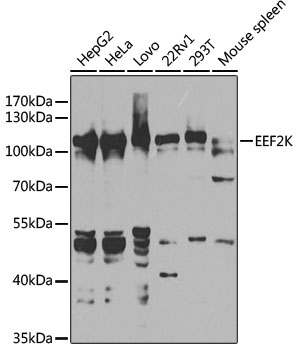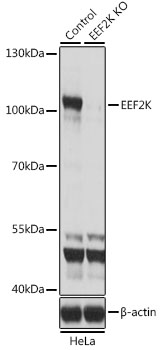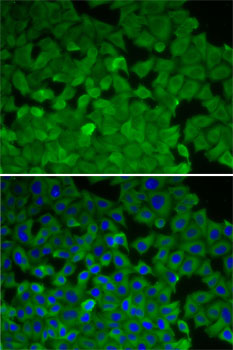-
Product Name
EEF2K Polyclonal Antibody
- Documents
-
Description
Polyclonal antibody to EEF2K
-
Tested applications
WB, IF
-
Species reactivity
Human, Mouse
-
Alternative names
EEF2K antibody; HSU93850 antibody; eEF-2K antibody; eukaryotic elongation factor 2 kinase antibody
-
Isotype
Rabbit IgG
-
Preparation
Antigen: Recombinant fusion protein containing a sequence corresponding to amino acids 406-725 of human EEF2K (NP_037434.1).
-
Clonality
Polyclonal
-
Formulation
PBS with 0.02% sodium azide, 50% glycerol, pH7.3.
-
Storage instructions
Store at -20℃. Avoid freeze / thaw cycles.
-
Applications
WB 1:500 - 1:2000
IF 1:50 - 1:200 -
Validations

Western blot - EEF2K Polyclonal Antibody
Western blot analysis of extracts of various cell lines, using EEF2K antibody at 1:1000 dilution.Secondary antibody: HRP Goat Anti-Rabbit IgG (H+L) at 1:10000 dilution.Lysates/proteins: 25ug per lane.Blocking buffer: 3% nonfat dry milk in TBST.Detection: ECL Basic Kit .Exposure time: 40s.

Western blot - EEF2K Polyclonal Antibody
Western blot analysis of extracts from normal (control) and EEF2K knockout HeLa cells, using EEF2K antibody at 1:1000 dilution.Secondary antibody: HRP Goat Anti-Rabbit IgG (H+L) at 1:10000 dilution.Lysates/proteins: 25ug per lane.Blocking buffer: 3% nonfat dry milk in TBST.Detection: ECL Basic Kit .Exposure time: 1s.

Immunofluorescence - EEF2K Polyclonal Antibody
Immunofluorescence analysis of A-549 cells using EEF2K antibody . Blue: DAPI for nuclear staining.
-
Background
Threonine kinase that regulates protein synthesis by controlling the rate of peptide chain elongation. Upon activation by a variety of upstream kinases including AMPK or TRPM7, phosphorylates the elongation factor EEF2 at a single site, renders it unable to bind ribosomes and thus inactive. In turn, the rate of protein synthesis is reduced.
Related Products / Services
Please note: All products are "FOR RESEARCH USE ONLY AND ARE NOT INTENDED FOR DIAGNOSTIC OR THERAPEUTIC USE"
